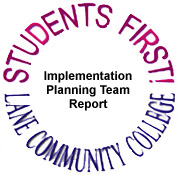| Lane Home Page | Search Lane |
| Website Accessibility |
 Chapter Seven
Chapter SevenCritical Success Factors Table of Contents | Students First! Page This chapter describes the factors that are critical to the successful implementation of the Students First! recommendations. As mentioned in the Students First! Redesign Team's final report, successful implementation requires effective organization, sufficient resources, and hard work. Both the Redesign and Implementation Planning Teams have benefited from Lane's commitment to ensuring that they had the resources necessary to complete their work. As implementation moves forward, a continued demonstrated commitment will be required to support the Implementation Team's work and all members of the Lane community. Executive Support Lane leadership's sustained support and commitment to change is vital to the success of implementation. The Executive Leadership Team must ensure that sufficient resources, continuous and clear communication, strategies to address potential resistance, and a willingness to modify policies are in place. As described in the Redesign Team's final report, the Executive Leadership Team must:
The Executive Leadership Team is also responsible for ensuring momentum is maintained by reducing or eliminating barriers to implementation. This includes the endorsement of policy or philosophy changes that are initiated in support of the recommendations. Communication The entire Lane community must receive continuous and clear communication concerning what changes are occurring, why and when the changes will occur, and how the changes will impact employees and their work. Various communication tools should be used and employees encouraged to provide feedback. The implementation coordinator responsible for communication will play a key role in ensuring that there are regular reports to the Lane community on the progress and successes of implementation. Training Employees will need to possess the skills and knowledge that will enable them to successfully function in a dynamic team-based environment. Training that addresses all aspects of team interaction, technical knowledge, and customer service is essential. Lane needs to ensure that time is specifically dedicated to training activities, and participation in training is integral to both the employee and team's responsibilities and performance. Lane must develop a structure that supports the delivery of training with a focus on the use of internal resources. The implementation coordinator responsible for training needs to identify resources that will provide employees with the guidance needed to understand how to effectively work in a team environment. Human Resource Practices Prior to the creation of teams, Lane will need to develop job descriptions that accurately reflect all team member skills and responsibilities. In addition, evaluation criteria that incorporate team and individual performance need to be established. Personnel Services will play a key role in facilitating and initiating Lane's progression to a team-based structure for the services to students organization. In particular, the implementation coordinator responsible for human resources will need to identify resources that will assist them in developing new job descriptions and a related compensation and incentive system. Labor Relations Lane must continue its proactive approach to addressing employee concerns related to collective bargaining contract issues and employment security. In particular, the active involvement of employee group representatives in implementation will serve both employees and the college in ensuring a smooth transition to a team-based organization. Technology The investment of resources in technology and related staffing will ensure that all employees possess innovative tools to deliver services to students. Lane needs to ensure that a support structure is in place to provide for both the development and maintenance of computer systems. Concurrently, it is essential that Lane continually assesses current and future capabilities to support various service delivery methods, particularly student self-service and ensure that college-wide technology needs are not compromised. Measurement and Assessment Performance measures are needed to ensure that the college realizes the intended improvements from its investment. The Redesign Team indicated that Lane needs to establish baseline performance measures for each recommendation. It will also be necessary to measure the effectiveness of process changes. The determination of process baseline measures will be made by the implementation coordinators and teams in consultation with the Office of Research. |
>> Return to Lane's Home Page >> Return to Process Redesign Project Main Page >> Return to top of page Lane Community College - Process Redesign Project 4000 East 30th Avenue, Eugene, OR 97405 Please direct comments about this site to webmaster@lanecc.edu Revised 12/2/96 (llb) © 1996-present Lane Community College |
